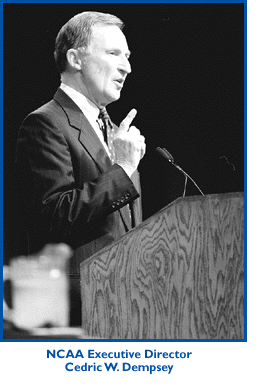The NCAA News - News and FeaturesJanuary 20, 1997
Dempsey urges continued progress on student-athlete welfare
BY JACK COPELAND
Managing Editor, THE NCAA NEWS
NASHVILLE -- NCAA Executive Director Cedric W. Dempsey lauded a decade of accomplishments in improving student-athlete welfare -- but prodded the membership to make certain that its rules, processes and priorities also reflect that concern -- during his 1997 State of the Association address.
 Speaking January 12 during the opening business session of the 91st Convention, Dempsey credited initial-eligibility and satisfactory-progress rules for effectively addressing criticism that student-athletes are exploited; playing-and-practice-seasons limitations for improving the college experience; and financial initiatives such as the academic-enhancement and special assistance funds for benefiting "every student-athlete participating in NCAA college sports."
Speaking January 12 during the opening business session of the 91st Convention, Dempsey credited initial-eligibility and satisfactory-progress rules for effectively addressing criticism that student-athletes are exploited; playing-and-practice-seasons limitations for improving the college experience; and financial initiatives such as the academic-enhancement and special assistance funds for benefiting "every student-athlete participating in NCAA college sports."
But he also noted what he termed the irony "that after years of working to improve the welfare of student-athletes, the NCAA is perceived as acting against the interests of those student-athletes."
He told delegates: "That's our fault."
Dempsey said the NCAA's negative image is attributable to "our sometimes cumbersome processes" and "how we prioritize our principles."
Opposite impression
"Some of our processes, carefully constructed to be fair, occasionally create an impression of being just the opposite -- of being unfair, of creating injustice," Dempsey said. "We can't let this continue."
He recalled a recent controversy in which student-athletes who wagered a football jersey on the outcome of games against each other were declared ineligible under procedures for dealing with rules violations.
"Many in the public and media leaped to the conclusion that the athletes had just received the eligibility equivalent of the death penalty....The reality, of course, is that at no time were the student-athletes in danger of losing their eligibility forever over a minor violation," he said.
"But the damage to our image had already been done. Thus, the problem lies in the way we handle and communicate how that process works."
Dempsey also noted problems during the past year in putting the tougher initial-eligibility standards of 1992 Convention Proposal No. 16 into effect. "Much of the criticism this legislation has drawn is directed, again, not at the rule but at its implementation," he said.
Not the only problem
Inefficient processes are not the only problem, however. Turning to what he termed a bigger issue, Dempsey said the Association seems to "assign incorrect priority to our principles when they conflict."
He cited the refusal of Division I members during recent years to permit student-athletes to work part-time while attending school.
Dempsey said the rule prohibiting work, like much of the Association's legislation, seeks to achieve parity of competition -- an important goal but not one that should be given priority over student-athlete welfare.
"We talk about protecting student-athletes from taking on too much, like a part-time job," he said. "But I think a major reason we have perpetuated that rule is to maintain a level playing field.
"For example, without our limitation on part-time work, University X would be afraid that University Y could recruit better players because there are better part-time jobs in Community Y. That priority is flat-out wrong."
Dempsey also said the Association's desire to maintain the principle of amateurism should not prevent athletes with talent in a discipline related to their academic majors from earning money in their future field.
"By giving these two principles -- the level playing field and amateurism -- greater priority than the welfare of the student-athlete, I believe that we hurt more than the individual student-athlete," he said. "We feed the perception that the NCAA acts against the interests of student-athletes, which hurts the organization and every member institution."
Achieving balance
Dempsey told the Convention that it can do a better job of meeting the needs of student-athletes without sacrificing its basic principles.
He urged adoption during the following day's business sessions of proposed legislation to permit student-athletes to work and earn income up to the cost of attendance. "I fully recognize this might bring some minor imbalance to that level playing field, but within the parameters of the legislation, it addresses an important financial need for student-athletes," he said.
He also supported adoption of proposals to permit student-athletes to participate without pay in activities such as writing and acting and to prevent student-athletes from being declared ineligible for various de minimus violations.
"In the end, what the NCAA is about, what your institutions are about, is the development and education of young people. We cannot -- we should not -- allow any other principles to overshadow that mission," Dempsey said.
|